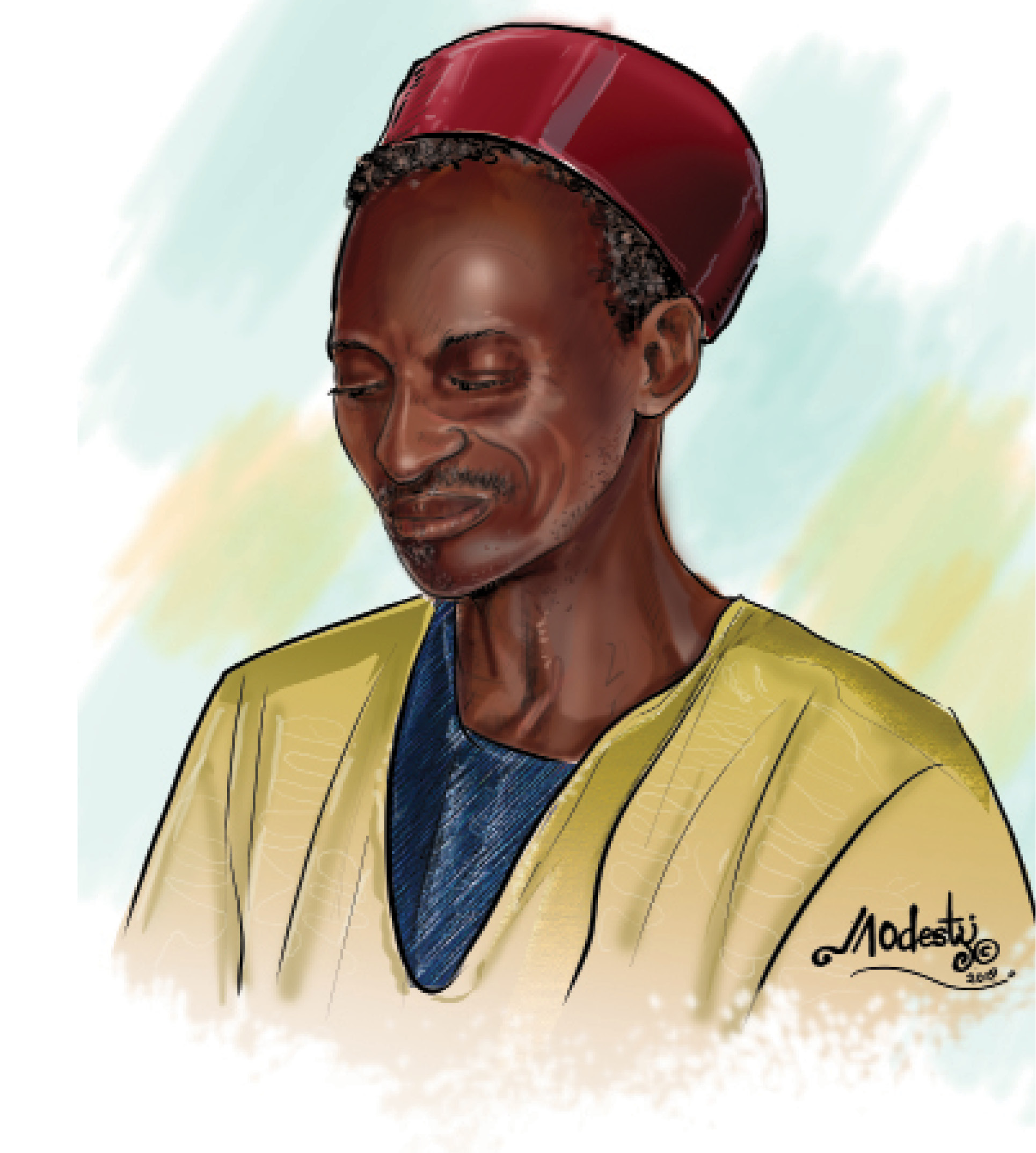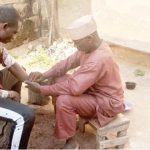As another day crawled in by thirty minutes only in June 1999, a great man lay sick in a bed at the University Teaching Hospital in Kano. The only family member in the room, his daughter Jamila, had been dozing uneasily on a chair beside him, not knowing that he was quietly bidding goodbye to an eventful life. The third person in the room, a nurse, Umar Ali Dodo, told her at that minute, “If you want to take a nap, go to the room over there.” As she stood up to go, she saw the nurse turn the sick man on his side. As soon as she stepped out, at 12.30 am, her father breathed his last. It was Friday, June 18, 1999.
Alhaji Mamman Shata Katsina, the greatest of all Hausa musicians, was – give and take – 76 years old. He was buried that day in Daura, the city of his main benefactor, the Emir, Alhaji Muhammadu Bashar, where Jamila took him for the last rites even though he left no instruction that he should be buried there instead of his hometown Funtua or his nascent village Musawa.
As a mark of appreciation for his contributions to national development, he was awarded several honours, such as the ones by the Performing Musicians Association of Nigeria (PMAN), the U.S. Consulate in Kaduna, the Federal Government of Nigeria, and the Ahmadu Bello University, Zaria, which gave him an honorary doctorate degree in 1988. The biggest honour of all, indeed, is the high esteem in which his listeners hold him till today. There is hardly any musician in Hausa land who has continued to enjoy the adoration and devotion of his people such as Shata, decades after his demise.
Interestingly, there emerges a crop of devotees who yearn for his music in this age of cultural adulteration and assimilation imposed by globalisation. This is proof that Shata is going to live in the hearts and minds of a generation of listeners, many of whom may not have shared a life-time with him.
In the newest edition of the official biography of the singer, titled, “Shata Ikon Allah!” which I happened to write with contributions from three other researchers, there is a new section called “What Happened Afterwards?” That’s what this write-up is based on. In it, I give an overview of what transpired around Shata’s life in the years since his departure.
The first was the sharing of his estate among his inheritors in accordance to the Sharia law. This happened shortly after he died. The then Emir of Daura, Alhaji Muhammadu Bashar, set up a committee which collated the inheritance and shared it among the deserving family members. I pointed out in that section that Shata did not leave behind millions of naira as many people thought. Reason: he was a heavy spender in philanthropy, giving freely to all who came along in search of assistance. Not everyone knew that Shata sponsored many people to travel to Saudi Arabia for the Hajj pilgrimage or paid for other people’s marriages or children’s naming ceremonies or house rent. He also took good care of his family. Consequently, he did not save much from the huge gifts he received from his benefactors or the wealth he had made from his own businesses and farming.
His biography, which he personally endorsed, was also launched in Kaduna in July 2006. Late in coming (we had wanted it to be completed before he died), it was the pioneering, most serious attempt at documenting his life in book form and will remain the most authentic totem on his life. An updated, better edited and more aesthetically pleasant version was published late last year.
In June 2013, yours sincerely and a group of other enthusiasts, as well as some children of the late Shata, met at Arewa House in Kaduna and formed the Mamman Shata Memorial Association. In a speech that I shared on the occasion, which coincided with the 14th anniversary of his demise, I presented the need for not only the establishment of the association but also that of the founding of a Mamman Shata Centre or Mamman Shata Music Centre whose job would, among others, be to collect every Hausa song that can be found so that history would not wipe out the thousands of songs that have been composed and or recorded in the Hausa language. I pointed out that our songs – either by the old generation of singers such as Narambada, Caji, Shata, Doka, Uwaliya, Barmani, Uji, Danmaraya, etc., or the new generation such as Sani Danja, Ala, Yakubu, Fati Nijar, Fantimoti, Zango, Sharifai etc, are in danger of disappearing in the centuries to come. Not all of them, of course, but a great number need to be archived today so that future generations can access them. We shouldn’t sit idly by while the storms of life and history threaten their existence.
Another development since Shata’s demise was the availability of some of his songs as telephone ring tones. The songs were promoted on the MTN network, and many subscribers are still using them for a fee that is shared between the company and members of the Shata family in a deal that is obscured in secrecy. Most family members do not know how the deal was struck and their exact entitlement. However, the bottom-line as far as one is concerned is that Shata, more than any other traditional musician, is being heard in ring tones.
Shata was also honoured posthumously. The first and biggest honour came from the Federal Government which on February 28, 2014 conferred on him and some selected artistes the award of “Internationally Acclaimed Artists, Literary Icons and Journalists” during its Centenary Awards. At a ceremony held at the Presidential Villa in Abuja, President Goodluck Jonathan personally handed over a plaque for the award to the Shata family. The only other singer given a similar honour that night was the late Afrobeat king, Fela Anikulapo Kuti. It reminded us about the first big award conferred on Shata by the Federal Government, the Member of the Order of the Niger (MON) given to him in 1976.
Another honour was conferred on Shata, this time by the Kaduna State Radio, which was celebrating the return of its AM channel to the airwaves. The station, through Governor Ramalan Yero, who was present at the ceremony, gave an award to only two musicians that night – Mamman Shata and Danmaraya Jos. It was shortly after that event Danmaraya died, following an illness.
It was also after Shata’s death that internet usage reached an appreciable peak amongst the youth in Nigeria. This spawned a whole new range of devotion to his music as several Shata chat groups sprang up on Facebook and later WhatsApp. Shata’s songs can also be found on YouTube as well as a few other social media sites.
During his life time, Shata had frowned at his own child becoming a musician. He would rather they go to school. This was in recognition of the potential of education to oneself and to the society at large, couched in the memory of some of the nasty experiences he personally encountered in some places where he was contemptuously regarded as a “mere singer”. When his eldest son, Lawal (Magaji), took to music, it was against that wish. Now after the death of Shata, another son of his, Sanusi, began a career in music in 2014. Sanusi has tried to carve a niche for himself in that realm.
Earlier in 2015 at the Bayero University, a leading scholar in Hausa Music, Prof. Sa’idu Muhammad Gusau, had organised a discussion on ‘the Shata inheritors’ – some young men who have taken up singing in the mold of the late legend. The idea was to introduce Shata’s art to Hausa students in the university. As such, Sanusi Shata, Hamsabi Shatan Zamfara and Aminu Alan Waka were invited to perform live before the students. It was a rambunctious outing, and everyone simply lapped it up.
To sum up, I should say that this recap is a lesson in life. Shata had offered his service to humanity, which appreciates him. I am yet to meet or hear anybody portraying him in bad light. The revered Sheikh Dahiru Usman Bauchi described him last year as “dan Aljanna”, i.e. one who will enter paradise.
May Shata continue to live long – in hearts and in minds – and may his soul rest in peace, amen.
Sheme, the official biographer of Alhaji Mamman Shata, is the Director of Media and Publicity, National Open University of Nigeria (NOUN)

 Join Daily Trust WhatsApp Community For Quick Access To News and Happenings Around You.
Join Daily Trust WhatsApp Community For Quick Access To News and Happenings Around You.


